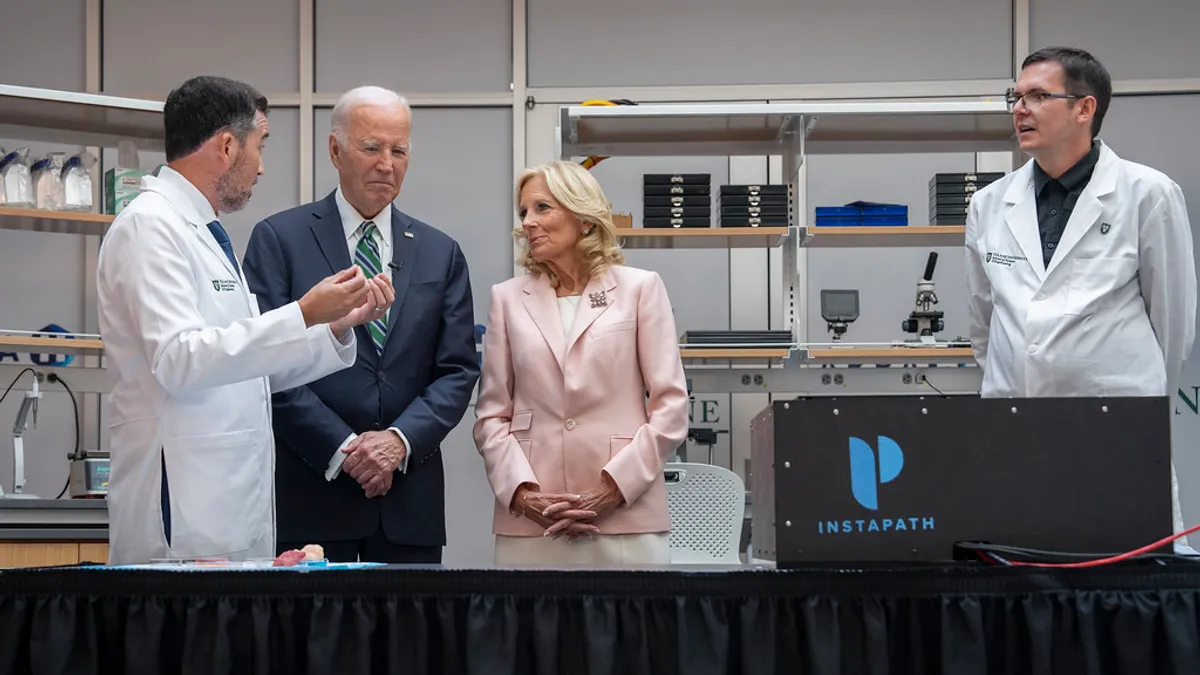Dive Brief:
- President Joe Biden and First Lady Jill Biden on Tuesday said $150 million in funding will be awarded to teams developing medical technologies to help surgeons remove cancerous tumors with higher accuracy.
- The Department of Health and Human Services’ Advanced Research Projects Agency for Health (ARPA-H) will distribute the funds to eight teams working on imaging tools and microscopes to make it easier for surgeons to see critical structures and ensure all cancer is removed during a procedure.
- The awards are part of the White House’s Cancer Moonshot initiative, with the goal of reducing cancer deaths by at least half by 2047.
Dive Insight:
ARPA-H is a new agency proposed by Biden and Vice President Kamala Harris to speed up biomedical and health solutions. The agency was formed in 2022 after Congress earmarked $1 billion in funding for its first three years. So far, ARPA-H has invested more than $400 million into cancer treatment, according to a statement from the Biden administration.
The latest round of awards is focused on technologies to improve treatment of solid tumors.
“Surgical procedures are often the first treatment option for some two million Americans diagnosed with cancer each year,” ARPA-H Director Renee Wegrzyn said in a statement. “This lack of precision can lead to repeat surgeries, harder recoveries, cancer recurrence, and higher health care costs. Our hope is to advance cancer surgery so that we remove cancer the first time and every time.”
The funds will be awarded to eight groups: Dartmouth College; Johns Hopkins University; Rice University; Tulane University; University of California, San Francisco; University of Illinois Urbana-Champaign; University of Washington and Cision Vision.
The awards are divided into three different technical areas.
Tulane, Rice and the University of Washington will focus on microscope technologies to visualize the surface of excised tumors and identify whether cancer cells remain in the patient before surgery is completed. All three groups are working on algorithms to help classify the imaged cells.
UCSF, University of Illinois and Johns Hopkins will work on technologies to identify microscopic cancer remnants inside the patient and help surgeons remove remaining cancer cells before the end of the procedure.
Finally, Dartmouth, Johns Hopkins and Cision Vision will work on imaging solutions to ensure critical anatomy like blood vessels and nerves are visible to surgeons, preventing accidental damage.
The selected teams are part of ARPA-H’s Precision Surgical Interventions program. They’re required to ensure the solutions they design are compatible with all users. For example, a tool designed for surgeons must fit different hand sizes.
The developers must also validate their devices in patient populations that reflect the demographics of the disease being studied, and they must prioritize lower-cost solutions and test their devices in a rural hospital during the program.











